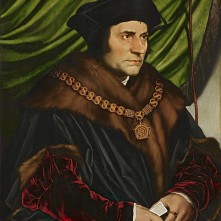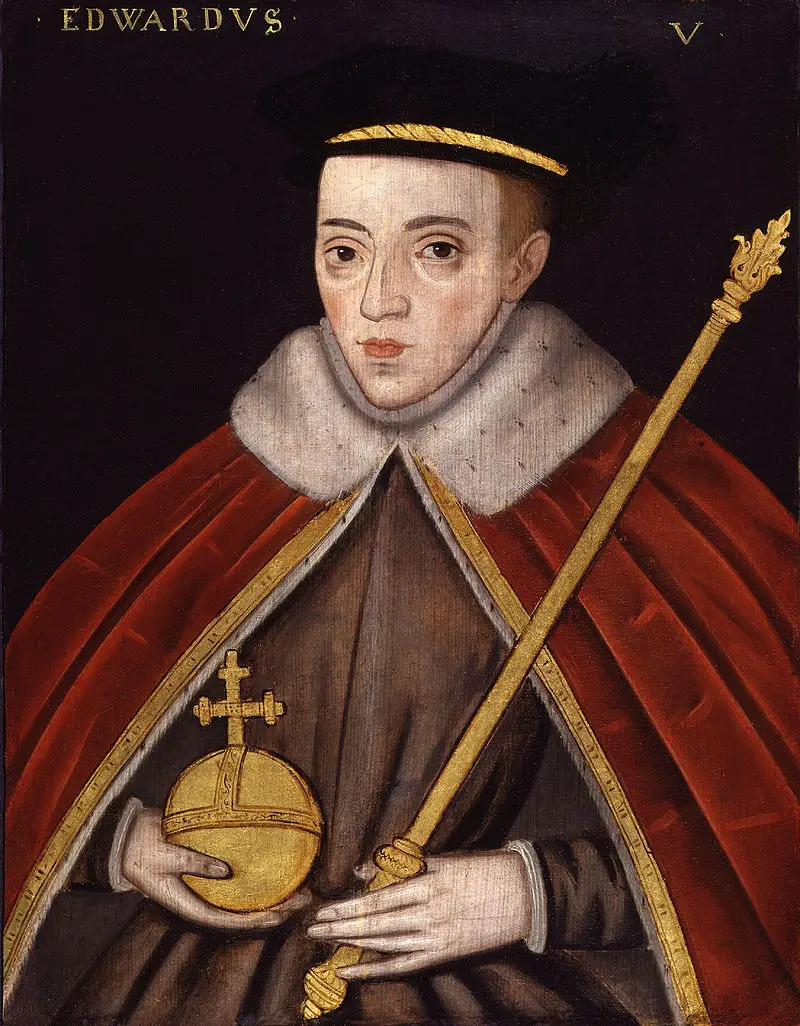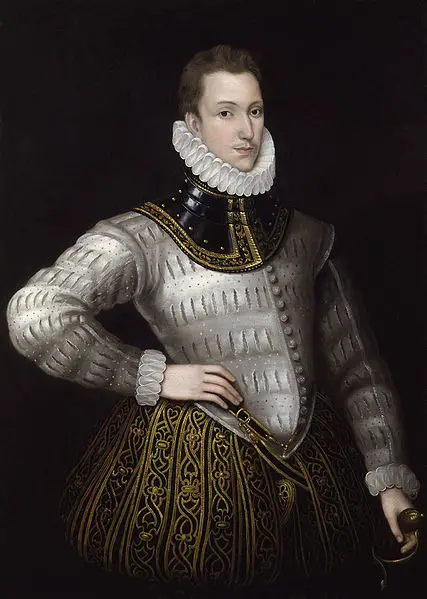23 October
1545 – Death of Sir Humphrey Wingfield, lawyer, Speaker of the House of Commons (1533-36) and patron of humanist education, at Ipswich.
1556 – Death of Sir John Gresham, brother of Sir Richard Gresham and Lord Mayor of London (1547). He was buried in the church of St Michael Bassishaw.
1570 – Burial of John Hopkins, poet, psalmodist and Church of England clergyman, at Great Waldingfield. Churchman and historian John Bale described Hopkins as “not the least significant of British poets of our time”. Hopkins' psalms were included in the 1562 “The whole booke of Psalmes, collected into Englysh metre by T. Starnhold, J. Hopkins & others”.
24 October
1521 – Death of Robert Fayrfax (Fairfax), church musician and composer, in St Albans. He was buried in the abbey there. Fayrfax was a Gentleman of the Chapel of the households of both Henry VII and Henry VIII, and attended the 1521 Field of Cloth of Gold. His works included the Magnificat Regale, Salve regina, six masses and English part-songs.
1525 – Death of Thomas Dacre, 2nd Baron Dacre of Gilsland, from a fall from his horse in the English borders. He was buried at Lanercost Priory, in the Dacre family mausoleum. Dacre fought at the Battle of Bosworth on the side of Richard III, but was able to earn Henry VII's trust and favour afterwards. Henry VII put Dacre in charge of the English west march and he was active in the borders, until he was imprisoned in early 1525 after trouble in the borders. He was fined and released in September 1525.
1537 - Queen Jane Seymour, Henry VIII's third wife, died just twelve days after giving birth to the future Edward VI. She died at Hampton Court Palace of suspected puerperal (childbed) fever. Click here for more information.
1545 – Death of Sir John Baldwin, judge and Chief Justice of the Common Pleas. He was buried at Aylesbury.
1572 – Death of Edward Stanley, 3rd Earl of Derby and Privy Councillor during the reigns of Mary I and Elizabeth I, at Lathom House in Lancashire. He was buried at the parish church in Ormskirk.
1589 – Death of Christopher St Lawrence, 7th Baron Howth and an active participant in Irish politics. He was buried in Howth Abbey in Dublin.
1590 – John White, governor of the Roanoke Colony, returned to England after failing to find the lost colonists, which included his daughter, Ellinor (Elenora), and his granddaughter, Virginia Dare. Virginia was the first child born to English parents in the Americas. Nobody ever found out what had happened to the colony.
25 October
1529 - Sir Thomas More became Henry VIII’s Lord Chancellor.
1532 – Henry VIII arrived back at Calais with Francis I to a 3,000 gun salute. Francis I sent Anne Boleyn a diamond via the Provost of Paris, but she was nowhere to be seen. She was waiting to make a dramatic entrance on the 27th.
1532 – Dukes of Norfolk and Suffolk received the collar of the Order of Saint-Michel from Francis I in a ceremony in Boulogne before leaving for Calais.
1536 – Four Chaplains of Poverty were appointed by the Pilgrimage of Grace rebels: Barnard Townley (Chancellor to the Bishop of Carlisle and Rector of Caldbeck), Christopher Blenkow (Vicar of Edenhall), Christopher Slee (Vicar of Castle Sowerby) and pluralist Roland Threlkeld. The rebels threatened them with execution if they failed in their duty, which was “to instruct the commons ‘concerning faith’”. Also on this day in 1536, and the following day, a special mass, called the Captains’ Mass was performed at Penrith Church.
1555 – A worn out Charles V abdicated a number of his titles, giving his son Philip control of the Low Countries.
1557 – Death of Sir William Cavendish, courtier, privy Councillor and administrator. Cavendish served Henry VIII as a Visitor of the Monasteries, in the Exchequer and as Treasurer of the Chamber, a post which he also held in Edward VI's reign. Cavendish married Bess of Hardwick in 1547.
1558 – Death of John Bird, Bishop of Chester, at Great Dunmow, Essex. He was buried there, in his own church. Bird was deprived of his see when Mary I came to the throne, due to his marriage, but was able to become Vicar of Great Dunmow after setting aside his wife.
26 October
1529 – Thomas More took his oath as Lord Chancellor. In Letters and Papers, it states: "and on the next day, Tuesday, 26 Oct., More took his oath as Chancellor in the Great Hall at Westminster, in presence of the dukes of Norfolk and Suffolk, Th. marquis of Dorset, Hen. marquis of Exeter, John earl of Oxford, Hen. earl of Northumberland, Geo. earl of Shrewsbury, Ralph earl of Westmoreland, John bishop of Lincoln, Cuthbert bishop of London, John bishop of Bath and Wells, Sir Rob. Radclyf, viscount Fitzwater, Sir Tho. Boleyn, viscount Rocheforde, Sir Wm.Sandys, Lord and others."
1536 – The rebels of the Pilgrimage of Grace halted at Scawsby Leys near Doncaster, where they met troops captained by the Duke of Norfolk. The rebels were said to number around 30,000 and Norfolk’s army only a fifth of the size, but Robert Aske chose to negotiate, and a deal was eventually struck, with Norfolk giving promises from Henry VIII that their demands would be met and that they would be pardoned. Aske then dismissed his troops. Unfortunately, Henry VIII later broke his promises to the rebels.
1538 – Geoffrey Pole, brother of Cardinal Reginald Pole and son of Margaret Pole, Countess of Salisbury, was interrogated in his prison at the Tower of London regarding letters he and his family had received from his brother, and words which he had uttered showing his support for the Cardinal, who had denounced the King and his policies in his treatise, Pro ecclesiasticae unitatis defensione.
1559 – Death of Sir Robert Southwell, lawyer and member of Parliament. It is thought that he was buried in Kent, probably near his seat of Mereworth. Southwell's offices included High Sheriff of Kent and Master of the Rolls. As High Sheriff of Kent in Mary I's reign, Southwell was active in putting down Wyatt's Rebellion of 1554.
27 October
c.1467 – Desiderius Erasmus, humanist, Catholic priest, classical scholar and theologian, was born on the night of the 27th/28th October in Rotterdam. His works included Enchiridion militis Christiani, or the Handbook of the Christian Soldier (1503), The Praise of Folly (1511), Institutio principis Christiani (1516) and Sileni Alcibiadis (1515).
1526 – Bishop Cuthbert Tunstall presided over the burning of Lutheran books, such as William Tyndale’s New Testament, at St Paul’s. He had issued an edict commanding that copies of the English New Testament should be found and delivered to him because members of Luther’s sect had "translated the new Testament into our English tongue, entermedling there with many heretical articles and erroneous opinions... seducing the simple people."
1532 - Anne Boleyn and her ladies, all in masks, made a dramatic entrance to the great banquet held by Henry VIII in Calais for Francis I. Click here to read more on this.
1538 – Baptism of Sir John Brograve, lawyer and member of Parliament, at St Mildred Poultry, London.
1561 – Birth of Mary Herbert (née Sidney), Countess of Pembroke, writer and literary patron, at Tickenhall, near Bewdley in Worcestershire. She was the daughter of Sir Henry Sidney and his wife, Mary (née Dudley), daughter of John Dudley, Duke of Northumberland, and sister of the poet Sir Philip Sidney. She married Henry Herbert, 2nd Earl of Pembroke, in 1577. Her known works include her Psalmes, her translations A Discourse of Life and Death and Antonius, and A dialogue between two shepherds, Thenot and Piers, in praise of Astrea, which was a pastoral dialogue written in praise of Elizabeth I.
28 October
1479 – Birth of Sir John Gage, courtier, at Burstow in Surrey. Gage served Henry VIII, Edward VI and Mary I, and his offices included Privy Councillor, Comptroller of Calais, Chancellor of the Duchy of Lancaster, Comptroller of the Household, Constable of the Tower and Lord Chamberlain.
1532 – The last full day of Henry VIII and Anne Boleyn’s time with Francis I in Calais. This included a chapter of the Order of the Garter and a wrestling match, which saw the English Cornish wrestlers beat the French side. This time, Henry VIII refrained from challenging the French king to a wrestling match, something he had done at the 1521 Field of Cloth of Gold.
1561 – Death of Sir Rowland Hill, merchant and Lord Mayor of London. He was buried in the church of St Stephen Walbrook.
1570 – Death of Thomas Causton, composer, in London. It is thought that he was a chorister in Cardinal Wolsey's household and a Gentleman of the Royal Household Chapel from 1550. His works included some metrical psalms which were published by John Day in 1563 in Whole Psalmes in Foure Partes, and also in Certaine Notes.
1571 – Death of William Parr, Marquis of Northampton and brother of Queen Catherine Parr, at Thomas Fisher’s house in Warwick. He had suffered from severe gout. Parr was laid to rest on 5th December in St Mary’s Church, Warwick. Click here to read more about Parr.
29 October
1532 – Henry VIII accompanied Francis I to the border between English Calais and France to bid farewell to him.
1586 – Four days after a commission had found Mary, Queen of Scots guilty of conspiring to assassinate Elizabeth I, Parliament met to discuss Mary’s fate. They decided that they should petition the Queen for Mary’s execution.
1605 – Death of George Clifford, 3rd Earl of Cumberland, courtier and naval commander, at the duchy house, near the Savoy in London. He was buried in the family vault in Holy Trinity Church, Skipton, near Skipton Castle. Clifford was Elizabeth I's second champion. He commanded a ship in the Anglo-Spanish War, and is known for capturing Fort San Felipe del Morro in San Juan, Puerto Rico, in 1598. Elizabeth I nicknamed him her “rogue”.








Leave a Reply